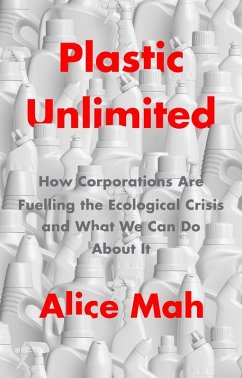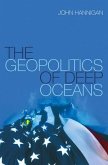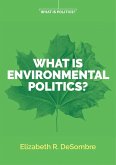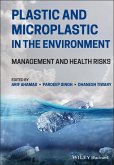Dieser Download kann aus rechtlichen Gründen nur mit Rechnungsadresse in A, B, BG, CY, CZ, D, DK, EW, E, FIN, F, GR, HR, H, IRL, I, LT, L, LR, M, NL, PL, P, R, S, SLO, SK ausgeliefert werden.
Beth Gardiner, author of Choked: The Age of Air Pollution and the Fight for a Cleaner Future
'Alice Mah blows the lid off the many myths and deceptive tactics propagated and employed by an industry desperately seeking to extend our continuing addiction to fossil fuels. This book offers illumination and ammunition for citizens striving for a just and better future.'
Von Hernandez, Global coordinator of the Break Free From Plastic movement
'Timely, engaging, comprehensive. Mah delivers the book I've been waiting for - a power-and-geopolitics analysis of the multifaceted plastics crisis, past and present.'
Rebecca Altman, writer and environmental sociologist
'Plastic Unlimited uncovers the driving forces behind the global problem of plastic waste that is damaging ecosystems, undermining public health, and widening inequalities. Alice Mah's incisive analysis shows that the current plastics predicament is not mainly a problem of weak waste management or poor consumer choices, but instead is driven by powerful corporations that dominate plastics production and use.'
Jennifer Clapp, University of Waterloo
'With breathtaking originality, Alice Mah exposes why plastics are poisoning our planet. Governance is failing. And corporations are out of control. Everyone should rush to read this incisive, fiery analysis. These companies must be held accountable.'
Peter Dauvergne, University of British Columbia
'Tracing plastics back to their petrochemical source, Plastic Unlimited presents an unflinching investigation into corporate responsibility for the plastics crisis. Mah convincingly argues that plastics consumption and climate change are interlinked, and offers strategies for confronting these fossil-fuelled crises through multi-scalar activism.'
Jennifer Gabrys, University of Cambridge and author of Citizens of Worlds: Open-Air Toolkits for Environmental Struggle
'This fantastic book is extremely informative, well written, and a must-read for anyone interested in the deeper roots of the plastics crisis.'
Frank Geels, University of Manchester
'Plastic Unlimited is a vitally important book. It provides a cogent, nuanced, and resounding critique of the fossil fuel industry's strategy to turn plastics into a saviour of global health, renewable energy technology, but, most of all, the industry's bottom line. Read this book to understand how the climate emergency and plastics production go hand in hand.'
Josh Lepawsky, Memorial University of Newfoundland
'Plastic Unlimited is an exquisitely useful book and a must-read for anyone interested in plastic pollution. Pulling back the curtain on concepts like lifecycle assessments (LCAs), the circular economy, net zero, and chemical recycling, Alice Mah reveals how each one has specific ingredients that align with the continued growth of plastic production. Academia has lagged behind NGO research and investigative journalism on the plastics industry, but Plastic Unlimited decisively ends that trend. It's the book I've been waiting for!'
Max Liboiron, Memorial University of Newfoundland and author of Pollution Is Colonialism
'Mah's brilliant analysis reveals how the continuous growth of the petrochemical industry draws upon an imaginary circular economy of plastics that leaves aside "waste colonialism" and environmental injustices.'
Joan Martínez-Alier, Autonomous University of Barcelona (ICTA)
"industry has deflected attention from the key problem: plastics production. We must tackle the problem at its root -- the capitalist imperative for limitless growth."
Ecosocialist Bookshelf
"Lively and sophisticated."
Nature
"A fiery analysis"
FastCompany









